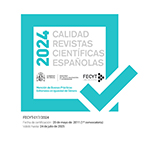El "djunta-mon" en la periferia de Lisboa: migración caboverdiana y comportamiento moral en un contexto de conflicto urbano
Resumen
El djunta-mon es una práctica tradicional de ayuda mutua que los migrantes caboverdianos han adaptado a su experiencia en la periferia de Lisboa. En este artículo analizamos los nuevos usos, formas y funciones que el djunta-mon asume en el contexto migratorio. Para ello se toma el caso de la Cova da Moura, un barrio atravesado por graves problemas sociales y urbanísticos y habitado mayoritariamente por población de origen caboverdiano. Se constata que la práctica del djunta-mon en este vecindario se enmarca en un proceso más amplio de reafirmación de la identidad étnica, que a su vez cobra sentido en un contexto de fuerte conflictividad urbana. Los resultados apuntan que, en estas condiciones, el djunta-mon experimenta notables modificaciones en sus formas y funciones, que le permiten operar como un sistema amplio de referencias morales para el grupo étnico caboverdiano.
Descargas
Descarga artículo
Licencia
La Revista de Antropología Social, para fomentar el intercambio global del conocimiento, facilita el acceso sin restricciones a sus contenidos desde el momento de su publicación en la presente edición electrónica, y por eso es una revista de acceso abierto. Los originales publicados en esta revista son propiedad de la Universidad Complutense de Madrid y es obligatorio citar su procedencia en cualquier reproducción total o parcial. Todos los contenidos se distribuyen bajo una licencia de uso y distribución Creative Commons Reconocimiento 4.0 (CC BY 4.0). Esta circunstancia ha de hacerse constar expresamente de esta forma cuando sea necesario. Puede consultar la versión informativa y el texto legal de la licencia.












